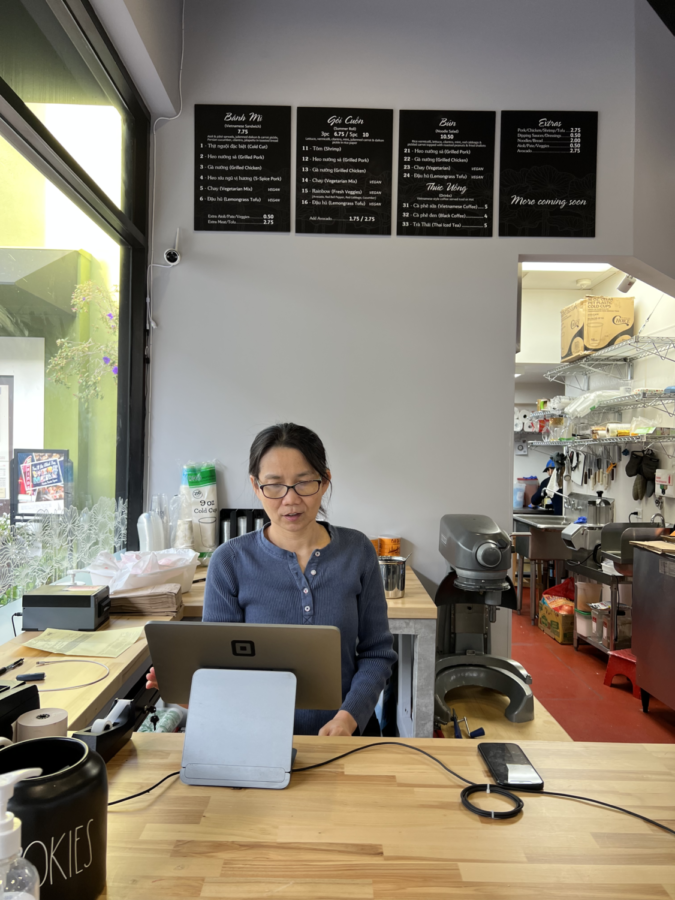Community Should Support AAPI-Owned Businesses
November 29, 2022
“I wanted to create something of my own, build it, watch it go through ups and downs, and stick to it. I believed that even in the worst times, things would get better.”
Hoang Ho, a single-mother and Vietnamese immigrant, cited this as her motivation for founding Kibi’s Cafe, whose Orinda Theatre Square location opened in Aug. 2022. As a grandchild of farmers in central Vietnam, Ho grew up surrounded by paddle fields, fruit and vegetable farms, open markets, and the fragrant scents of traditional Vietnamese street food. In 2018, three years after Ho immigrated to the U.S. with her two children, she decided to open the first Kibi’s Cafe in Walnut Creek and share Vietnam’s cuisine with the East Bay community.
With Asian American and Pacific Islander (AAPI) communities constituting 27 percent of the Bay Area’s population, according to Local News, their businesses are integral to the local economy, culture, and history. However, recent years were difficult for small Asian-owned businesses across the Bay Area and the country. Smaller companies don’t always have the established banking connections or manpower to apply for aid when business is rough, and this divide was exacerbated during the pandemic, Rodney Fong, president and CEO of the San Francisco Chamber of Commerce, said. The pandemic disproportionately impacted AAPI-owned businesses. JP Morgan Chase found that sales at AAPI-owned businesses dropped by more than 60 percent between 2019 and 2020, compared to other small businesses with a 50 percent drop in their sales. The economic impact of the pandemic created immense hardships for AAPI-owned business owners and employees.
Beyond the pandemic’s impacts on business, the Asian American community at large grappled with another painful threat — a surge in violence and racism against the Asian population. Between March 19 and Dec. 31, 2021, Stop AAPI Hate, an organization tracking anti-Asian incidents, found more than 2,800 accounts of racism and discrimination targeting Asian Americans across the U.S.
In the wake of Asian hate crimes and unequal opportunity for AAPI-owned businesses, thousands of people across the nation took to the streets to protest. While rallies and petitions are one way to incite systemic change, financial activism is another way in which consumers can bring power to disenfranchised communities. Entrepreneurship is a primary way in which low-income immigrants move upwards on the socioeconomic scale. By choosing to support AAPI-owned businesses, consumers contribute to a more equitable distribution of wealth. In addition, supporting AAPI-owned businesses translates into boosting AAPI pride, unity, self-determination, and integration into the community.
When Ho immigrated to the U.S., she hoped to escape personal and economic difficulties that she faced in Vietnam. However, during her first two years in the U.S., Ho felt intense nostalgia for Vietnam. Surrounded by American culture, she had no sense of belonging. “When I came to the Bay Area, I went through cultural shock: the food, education system, way of life, everything was different. I missed the feeling of living with your own people sharing the same culture and enjoying the same type of food,” Ho said. After the first two years, she began looking for ways to integrate into her community. She worked for the Contra Costa Crisis Center. Ho also gave her customers a role in developing the cafe menu. “Now I don’t feel like I’m missing that much. I have made new connections and I see different types of people,” she said. Ho’s experience reflects the challenges immigrants face in their new homes as well as the importance of proactively engaging with these communities and their businesses.
During the pandemic, Ho was forced to close her cafe in Walnut Creek for three months. “Those were hard times, but we got a lot of support from the community. You can’t do anything without connecting to the community you are living in,” she said. “So we just continued to work hard, sometimes fourteen consecutive days, sometimes fourteen hours a day. We were short on resources, and things were getting expensive. People didn’t want to work and my mom and son had to help out,” Ho said.
Eventually, Ho was able to reopen Kibi’s Cafe. She encourages the community to support small and minority-owned businesses because “it’s mutually beneficial for the consumer and the business.” She believes that AAPI-owned businesses contribute a great deal to the U.S. economy and culture. “Businesses like mine don’t have as much investment as fine dining, big restaurants, and big companies. But we bring a lot to the table.” By this, Ho does not only mean economic value. She believes that food is a ground on which people of different cultures can meet. “When you step into a different culture and try their food, you will be able to feel the connection. You will be able to embrace the taste of food even if it comes from far away. Cultural differences exist, but in that moment, something is common.”
Orinda is home to a myriad of small AAPI-owned businesses. One of these is Baan Thai, which opened in 2013. Baan Thai survived through the pandemic because of its loyal customers. “The pandemic was a really sad situation but I think everybody was happy we were open. We survived because of the people,” owner Jim Phoonpirom said. He said he “worked hard everyday, from the bottom up.” Attracting more customers called on his culinary ingenuity. He added local ingredients to traditional Thai recipes to develop Baan Thai’s unique culinary style. Phoonpirom also calls on the public to support small AAPI-owned businesses. “We don’t have many employees. We put a lot of energy into our work and do a lot for our customers. Our food is from family recipes, which reflect our culture. We get support from the people.”
Siam Orchid, an Orinda restaurant which opened in 2000, offers northern Thai cuisine and operates a full-service bar. Like most other small businesses, it suffered from the impacts of the pandemic but was able to survive off of takeout. Owner Sompong “Pepsi” Phanmongkol reports that take-out now accounts for 60 percent of orders, compared to 30 to 40 percent prior to the pandemic. Besides grappling with the effects of the pandemic, Siam Orchid also faced a robbery attempt. Fortunately, James Bice, one of the employees, was able to scare off the burglar. Since small AAPI-owned businesses are often targets of crime, they would benefit greatly from customer support.
Anya’s Kitchen, an Indian restaurant which opened earlier this year, is another local AAPI-owned business located in downtown Orinda. Before opening Anya’s Kitchen, owner Punjabi Dhaba ran a restaurant in Berkeley which struggled due to the pandemic. “There are always challenges, ups and downs. We’re a mom and pop store. It’s not a franchise, not a corporation. We have to pay the fees. And here, we make it fresh,” he said.
Behind every small AAPI-owned business is an individual and their story. Ho, Phoonpirom, and Phanmongkol are immigrants who sought a better life. Dhaba worked in the restaurant business ever since graduating from Berkeley High School in 1997. Despite the remarkable diversity within the AAPI community, Asian American small business owners in the U.S. face the common challenges of integration, attracting customers, and staying afloat in a world of systemic inequality and Asian hate. Supporting AAPI-owned businesses isn’t just the right thing to do — it is a way ordinary citizens can fight for a more equitable and culturally-diverse society. “For us business owners, it’s all about love and passion, from both sides,” Ho said. “I always dreamed of having a small shop, doing things at my own pace, and making decisions on my own. But when it got rough, we got a lot of support. That encouragement helped me gain confidence. It’s all about love and passion. And that comes from the community.”









Indie • Dec 7, 2022 at 9:32 pm
This article is so insightful! It’s really cool that you’re telling the stories of the people behind these businesses and helping them gain more exposure 😀